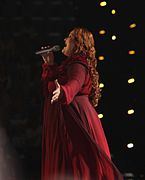Iceland in the Eurovision Song Contest
| Iceland in the Eurovision Song Contest | |
|---|---|
 | |
| Participating broadcaster | Ríkisútvarpið (RÚV) |
| Participation summary | |
| Appearances | 36 (27 finals) |
| First appearance | 1986 |
| Highest placement | 2nd: 1999, 2009 |
| Related articles | |
| Söngvakeppnin | |
| External links | |
| RÚV page | |
| Iceland's page at Eurovision.tv | |
 For the most recent participation see For the most recent participation seeIceland in the Eurovision Song Contest 2024 | |
Iceland has participated in the Eurovision Song Contest 36 times since its debut in 1986, missing only two contests since then, in 1998 and 2002, when prevented from competing due to finishing outside qualification places the preceding years. The country's best result is second place, which it achieved with Selma in 1999 and Yohanna in 2009. The Icelandic broadcaster for the contest is Ríkisútvarpið (RÚV), which also broadcasts Iceland's national selection competition, Söngvakeppnin.
Iceland has achieved a total of seven top ten placements, with the others being Stjórnin finishing fourth (1990), Heart 2 Heart seventh (1992), Birgitta eighth (2003), Hatari tenth (2019) and Daði og Gagnamagnið fourth (2021). Since the introduction of the semi-final round in 2004, Iceland has failed to qualify for the final nine times, including four years consecutively (2015–18). To date, Iceland is the only Nordic country that has yet to win the contest.
History
Iceland first entered Eurovision in 1986, or twenty years after RÚV was founded in 1966.
Iceland's best position at the contest is second place, which they have achieved twice: in 1999 when Selma represented Iceland with the song "All Out of Luck", and came second to Sweden's Charlotte Nilsson and in 2009 when Yohanna came second to Norway's Alexander Rybak with the ballad "Is It True?".
In contrast Iceland's worst result in a grand final is last place, which has been achieved twice to date: in 1989, when Daníel Ágúst received nul points for his entry "Það sem enginn sér", and in 2001, when Two Tricky received three points for their entry "Angel".
With the introduction of semi-finals in 2004, Iceland automatically qualified for the final that year due to Birgitta's eighth place the previous year. In 2008, Iceland reached the final for the first time since then, when Euroband sang "This Is My Life". Iceland qualified for the final in seven consecutive contests between 2008 and 2014 before failing to qualify for the final from 2015 to 2018. In 2019, Hatari brought the country back to the final for the first time since 2014, finishing tenth, which was followed by a fourth-place finish for Daði og Gagnamagnið in 2021, Iceland's joint-second best result to date, and a 23rd-place finish for Systur in 2022. Further non-qualifications came with Diljá in 2023 and Hera Björk in 2024.
Despite these mixed fortunes, Iceland is the second most successful country never to have won the contest (behind only Malta).
Sigríður Beinteinsdóttir has participated five times (as a member of a group in 1990 and 1992, as a solo artist in 1994, and as a background vocalist in 1991 and 2006). Hera Björk has also participated five times (as a backing vocalist in 2008, 2009 and 2015, and as a solo artist in 2010 and 2024). Stefán Hilmarsson has participated twice (as a member of a group in 1988 and as a member of a duo in 1991), as have Selma Björnsdóttir (1999 and 2005), Eiríkur Hauksson (as a member of a group in 1986 and as a solo artist in 2007. Eiríkur has in addition participated for Norway in 1991 as a member of a group.), Jón Jósep Snæbjörnsson (as a solo artist in 2004 and as a member of a duo in 2012) and Greta Salóme Stefánsdóttir (as a member of a duo in 2012 and as a solo artist in 2016).
Participation overview
| 1 | First place |
| 2 | Second place |
| 3 | Third place |
| ◁ | Last place |
| X | Entry selected but did not compete |
| † | Upcoming event |
| Year | Artist | Song | Language | Final | Points | Semi | Points |
|---|---|---|---|---|---|---|---|
| 1986 | ICY | "Gleðibankinn" | Icelandic | 16 | 19 | No semi-finals | |
| 1987 | Halla Margrét | "Hægt og hljótt" | Icelandic | 16 | 28 | ||
| 1988 | Beathoven | "Sókrates" | Icelandic | 16 | 20 | ||
| 1989 | Daníel | "Það sem enginn sér" | Icelandic | 22 ◁ | 0 | ||
| 1990 | Stjórnin | "Eitt lag enn" | Icelandic | 4 | 124 | ||
| 1991 | Stefán and Eyfi | "Nína" | Icelandic | 15 | 26 | ||
| 1992 | Heart 2 Heart | "Nei eða já" | Icelandic | 7 | 80 | ||
| 1993 | Inga | "Þá veistu svarið" | Icelandic | 13 | 42 | Kvalifikacija za Millstreet | |
| 1994 | Sigga | "Nætur" | Icelandic | 12 | 49 | No semi-finals | |
| 1995 | Bo Halldórsson | "Núna" | Icelandic | 15 | 31 | ||
| 1996 | Anna Mjöll | "Sjúbídú" | Icelandic | 13 | 51 | 10 | 59 |
| 1997 | Paul Oscar | "Minn hinsti dans" | Icelandic | 20 | 18 | No semi-finals | |
| 1999 | Selma | "All Out of Luck" | English | 2 | 146 | ||
| 2000 | August and Telma | "Tell Me!" | English | 12 | 45 | ||
| 2001 | Two Tricky | "Angel" | English | 22 ◁ | 3 | ||
| 2003 | Birgitta | "Open Your Heart" | English | 8 | 81 | ||
| 2004 | Jónsi | "Heaven" | English | 19 | 16 | Top 11 in 2003 contest[a] | |
| 2005 | Selma | "If I Had Your Love" | English | Failed to qualify | 16 | 52 | |
| 2006 | Silvía Night | "Congratulations" | English | 13 | 62 | ||
| 2007 | Eiríkur Hauksson | "Valentine Lost" | English | 13 | 77 | ||
| 2008 | Euroband | "This Is My Life" | English | 14 | 64 | 8 | 68 |
| 2009 | Yohanna | "Is It True?" | English | 2 | 218 | 1 | 174 |
| 2010 | Hera Björk | "Je ne sais quoi" | English, French | 19 | 41 | 3 | 123 |
| 2011 | Sjonni's Friends | "Coming Home" | English | 20 | 61 | 4 | 100 |
| 2012 | Greta Salóme and Jónsi | "Never Forget" | English | 20 | 46 | 8 | 75 |
| 2013 | Eythor Ingi | "Ég á líf" | Icelandic | 17 | 47 | 6 | 72 |
| 2014 | Pollapönk | "No Prejudice" | English | 15 | 58 | 8 | 61 |
| 2015 | Maria Olafs | "Unbroken" | English | Failed to qualify | 15 | 14 | |
| 2016 | Greta Salóme | "Hear Them Calling" | English | 14 | 51 | ||
| 2017 | Svala | "Paper" | English | 15 | 60 | ||
| 2018 | Ari Ólafsson | "Our Choice" | English | 19 ◁ | 15 | ||
| 2019 | Hatari | "Hatrið mun sigra" | Icelandic | 10 | 232 | 3 | 221 |
| 2020 | Daði og Gagnamagnið | "Think About Things" | English | Contest cancelled[b] X | |||
| 2021 | Daði og Gagnamagnið | "10 Years" | English | 4 | 378 | 2 | 288 |
| 2022 | Systur | "Með hækkandi sól" | Icelandic | 23 | 20 | 10 | 103 |
| 2023 | Diljá | "Power" | English | Failed to qualify | 11 | 44 | |
| 2024 | Hera Björk | "Scared of Heights" | English | 15 ◁ | 3 | ||
Related involvement
Conductors
| Year | Conductor[c] | Notes | Ref. |
|---|---|---|---|
| 1986 | Gunnar Þórðarson | [d] | [1] |
| 1987 | Hjálmar H. Ragnarsson | ||
| 1988 | No conductor | ||
| 1989 | |||
| 1990 |  Jon Kjell Seljeseth Jon Kjell Seljeseth | [e] | |
| 1991 | Jón Ólafsson | ||
| 1992 |  Nigel Wright Nigel Wright | [f] | |
| 1993 |  Jon Kjell Seljeseth Jon Kjell Seljeseth | ||
| 1994 |  Frank McNamara Frank McNamara | ||
| 1995 | |||
| 1996 | Ólafur Gaukur | ||
| 1997 | Szymon Kuran |
Heads of delegation
| Year | Head of delegation | Ref. |
|---|---|---|
| 2017–2023 | Felix Bergsson | |
| 2024– | Rúnar Freyr Gíslason |
Commentators and spokespersons
Iceland has broadcast the show since 1970. The first to be broadcast live was the 1983 edition after the plan to broadcast the 1982 contest failed. Since 1986, RÚV has broadcast the contest on the radio using same commentator for TV and radio and the Internet broadcast since early 2000s.
| Year | Channel(s) | Commentator(s) | Spokesperson | Ref. |
|---|---|---|---|---|
| 1970 | Sjónvarpið | Unknown | Did not participate | [6] |
| 1971 | Björn Matthíasson | [7] | ||
| 1972 | [8] | |||
| 1973 | Jón O. Edwald | [9] | ||
| 1974 | Unknown | [10] | ||
| 1975 | Dóra Hafsteinsdóttir | [11] | ||
| 1976 | Jón Skaptason | [12] | ||
| 1977 | Unknown | [13] | ||
| 1978 | Ragna Ragnars | [14] | ||
| 1979 | Björn Baldursson | [15] | ||
| 1980 | [16] | |||
| 1981 | Dóra Hafsteinsdóttir | [17] | ||
| 1982 | Pálmi Jóhannesson | [18] | ||
| 1983 | Unknown | [19] | ||
| 1984 | [20] | |||
| 1985 | Hinrik Bjarnason | [21] | ||
| 1986 | Sjónvarpið, Rás 1 | Þorgeir Ástvaldsson | Guðrún Skúladóttir | [22][23] |
| 1987 | Kolbrún Halldórsdóttir | [24][25] | ||
| 1988 | Hermann Gunnarsson | [26][27] | ||
| 1989 | Arthúr Björgvin Bollason | Erla Björk Skúladóttir | [28][29] | |
| 1990 | Unknown | [30] | ||
| 1991 | Sjónvarpið, Rás 2 | [31] | ||
| 1992 | Árni Snævarr | [32] | ||
| 1993 | Sjónvarpið | Jakob Frímann Magnússon | [33] | |
| 1994 | Sjónvarpið, Rás 2 | Sigríður Arnardóttir | [34][35] | |
| 1995 | Áslaug Dóra Eyjólfsdóttir | [36][37] | ||
| 1996 | Svanhildur Konráðsdóttir | [38][39] | ||
| 1997 | [40][41] | |||
| 1998 | Páll Óskar Hjálmtýsson | Did not participate | [42] | |
| 1999 | Gísli Marteinn Baldursson | Áslaug Dóra Eyjólfsdóttir | [43][44] | |
| 2000 | Ragnheiður Elín Clausen | |||
| 2001 | Eva María Jónsdóttir | |||
| 2002 | Logi Bergmann Eiðsson | Did not participate | ||
| 2003 | Gísli Marteinn Baldursson | Eva María Jónsdóttir | ||
| 2004 | Sigrún Ósk Kristjánsdóttir | |||
| 2005 | Ragnhildur Steinunn Jónsdóttir | |||
| 2006 | Sigmar Guðmundsson | |||
| 2007 | ||||
| 2008 | Brynja Þorgeirsdóttir | |||
| 2009 | Þóra Tómasdóttir | |||
| 2010 | Jóhanna Guðrún Jónsdóttir | |||
| 2011 | Hrafnhildur Halldórsdóttir | Ragnhildur Steinunn Jónsdóttir | ||
| 2012 | Matthías Matthíasson | |||
| 2013 | Felix Bergsson | María Sigrún Hilmarsdóttir | ||
| 2014 | Benedikt Valsson | |||
| 2015 | Sigríður Halldórsdóttir | |||
| 2016 | Gísli Marteinn Baldursson | Unnsteinn Manuel Stefánsson | ||
| 2017 | Björgvin Halldórsson | |||
| 2018 | Edda Sif Pálsdóttir | |||
| 2019 | Jóhannes Haukur Jóhannesson | |||
| 2020 | Not announced before contest was cancelled | |||
| 2021 | Gísli Marteinn Baldursson | Hannes Óli Ágústsson | ||
| 2022 | Árný Fjóla Ásmundsdóttir | |||
| 2023 | Einar Stefánsson | |||
| 2024 | Gunna Dís Emilsdóttir | Friðrik Ómar Hjörleifsson | ||
Other shows
| Show | Commentator | Channel | Ref. |
|---|---|---|---|
| Songs of Europe | No commentator | RÚV | |
| Congratulations: 50 Years of the Eurovision Song Contest | Gísli Marteinn Baldursson | ||
| Eurovision Song Contest's Greatest Hits | No commentator | ||
| Eurovision: Europe Shine a Light | Felix Bergsson |
Photo gallery
-
 Eiríkur Hauksson in Helsinki (2007)
Eiríkur Hauksson in Helsinki (2007) -
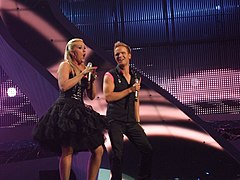
-
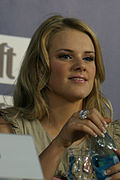
- Hera Björk in Oslo (2010)
-

-
 Eythor Ingi in Malmö (2013)
Eythor Ingi in Malmö (2013) -

-
 María Ólafs in Vienna (2015)
María Ólafs in Vienna (2015) -
 Greta Salóme in Stockholm (2016)
Greta Salóme in Stockholm (2016) -
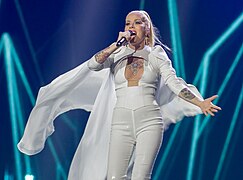
-
 Ari Ólafsson in Lisbon (2018)
Ari Ólafsson in Lisbon (2018) -
 Hatari in Tel Aviv (2019)
Hatari in Tel Aviv (2019) -
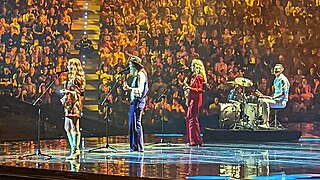
-

In popular culture
The 2020 Netflix comedy film Eurovision Song Contest: The Story of Fire Saga depicts Will Ferrell and Rachel McAdams as a fictional duo from Iceland competing in Eurovision. Hannes Óli Ágústsson, who plays Olaf Yohansson in the film, reprised the role for the voting segment of the 2021 contest final, in which he presented the points on behalf of the Icelandic jury.[50]
Notes
- ^ According to the then-Eurovision rules, the top ten non-Big Four countries from the previous year along with the Big Four automatically qualified for the Grand Final without having to compete in semi-finals. For example, if Germany and France placed inside the top ten, the 11th and 12th spots were advanced to next year's Grand Final along with all countries ranked in the top ten.
- ^ The 2020 contest was cancelled due to the COVID-19 pandemic.
- ^ All conductors are of Icelandic nationality unless otherwise noted.
- ^ Conducted by Þórir Baldursson at the national final.
- ^ Conducted by Vilhjálmur Guðjónsson in the national final.
- ^ Conducted by Jón Ólafsson in the national final.
References
- ^ Roxburgh, Gordon (2016). Songs for Europe: The United Kingdom at the Eurovision Song Contest. Vol. Three: The 1980s. Prestatyn: Telos Publishing. ISBN 978-1-84583-118-9.
- ^ Granger, Anthony (8 April 2018). "Iceland: Netta Barzilai Tops Alla leið Show One". Eurovoix. Retrieved 10 July 2020.
- ^ Granger, Anthony (3 May 2019). "Iceland: "Cannot Take Qualification For Granted" – Felix Bergsson". eurovoix.com. Retrieved 6 December 2019.
- ^ Gunnarsson, Oddur Ævar (4 August 2024). "Gísli Marteinn lýsir ekki Eurovision í ár" [Gísli Marteinn is not commenting Eurovision this year]. Visir.is (in Icelandic). Vísir. Retrieved 8 April 2024.
- ^ Granger, Anthony (10 April 2024). "Iceland: Rúnar Freyr New Head of Delegation for Eurovision". Eurovoix. Retrieved 10 April 2024.
- ^ "Sjónvarp – laugurdagur 4. april 1970" [Television – Saturday 4 April 1970]. Morgunblaðið (in Icelandic). Reykjavík, Iceland. 4 April 1970. p. 29. Retrieved 4 January 2023 – via Timarit.is.
- ^ "Sjónvarp – Sunnudagur 18. apríl" [Television – Sunday 18 April]. Tíminn (in Icelandic). Reykjavík, Iceland. 18 April 1971. p. 21. Retrieved 5 January 2023 – via Timarit.is.
- ^ "Sjónvarp – Mánudagur 17. apríl 1972" [Television – Monday 17 April 1972]. Vísir (in Icelandic). Reykjavík, Iceland. 17 April 1972. p. 17. Retrieved 5 January 2023 – via Timarit.is.
- ^ "Sjónvarp – Sunnudagur 29. apríl 1973" [Television – Sunday 29 April 1973]. Vísir (in Icelandic). Reykjavík, Iceland. 28 April 1973. p. 17. Retrieved 6 January 2023 – via Timarit.is.
- ^ "'ABBA' með lagið "Waterloo" leggja Evrópu að fótum sér" ['ABBA' with the song "Waterloo" bring Europe to its feet]. Vísir (in Icelandic). Reykjavík, Iceland. 17 May 1974. p. 13. Retrieved 14 March 2023 – via Timarit.is.
- ^ "Sjónvarp um helgina" [TV this weekend]. Þjóðviljinn (in Icelandic). Reykjavík, Iceland. 13 April 1975. p. 18. Retrieved 8 January 2023 – via Timarit.is.
- ^ "Sjónvarp – Sunnudagur 25. apríl" [Television – Sunday 25 April]. Dagblaðið (in Icelandic). Reykjavík, Iceland. 24 April 1976. p. 23. Retrieved 9 January 2023 – via Timarit.is.
- ^ "Sjónvarp – Föstudagur 20. maí" [Television – Friday 20 May]. Dagblaðið (in Icelandic). Reykjavík, Iceland. 20 May 1977. p. 27. Retrieved 9 January 2023 – via Timarit.is.
- ^ "Sjónvarp – Sunnudagur 30. apríl" [Television – Sunday 30 April]. Dagblaðið (in Icelandic). Reykjavík, Iceland. 29 April 1978. p. 22. Retrieved 10 January 2023 – via Timarit.is.
- ^ "Sjónvarp – Mánudagur 16. apríl" [Television – Monday 16 April]. Dagblaðið (in Icelandic). Reykjavík, Iceland. 11 April 1979. p. 18. Retrieved 10 January 2023 – via Timarit.is.
- ^ "Sjónvarp – Laugardagur 26. apríl" [Television – Saturday 26 April]. Dagblaðið (in Icelandic). Reykjavík, Iceland. 26 April 1980. p. 23. Retrieved 11 January 2023 – via Timarit.is.
- ^ "Dagskráin – Sunnudagur 19. apríl" [The schedule – Sunday 19 April]. Morgunblaðið (in Icelandic). Reykjavík, Iceland. 16 April 1981. p. 26. Retrieved 12 January 2023 – via Timarit.is.
- ^ "Á skjánum – Föstudagur 30. apríl" [On screen – Friday 30 April]. Morgunblaðið (in Icelandic). Reykjavík, Iceland. 30 April 1982. p. 4. Retrieved 12 January 2023 – via Timarit.is.
- ^ "Sjónvarp – Laugardagur 23. apríl" [Television – Saturday 23 April]. DV (in Icelandic). Reykjavík, Iceland. 22 April 1983. p. 19. Retrieved 13 January 2023 – via Timarit.is.
- ^ "Sjónvarp – Laugardagur 5. maí" [Television – Saturday 5 May]. DV (in Icelandic). Reykjavík, Iceland. 5 May 1984. p. 19. Retrieved 13 January 2023 – via Timarit.is.
- ^ "Laugardagur 4. maí – Sjónvarp" [Saturday 4 May – Television]. DV (in Icelandic). Reykjavík, Iceland. 4 May 1985. p. 23. Retrieved 14 January 2023 – via Timarit.is.
- ^ "Útvarp/Sjónvarp" [Radio/Television]. Tíminn (in Icelandic). Reykjavík, Iceland. 3 May 1986. p. 23. Retrieved 13 January 2023 – via Timarit.is.
- ^ "Íslenska dómnefndin" [The Icelandic jury]. Þjóðviljinn (in Icelandic). Reykjavík, Iceland. 1 May 1986. p. 2. Retrieved 28 May 2024 – via Timarit.is.
- ^ "Útvarp/Sjónvarp" [Radio/Television]. Morgunblaðið (in Icelandic). Reykjavík, Iceland. 9 May 1987. p. 6. Retrieved 15 January 2023 – via Timarit.is.
- ^ "Ellefu dómnefndarmenn valdir fyrir söngvakeppnina" [Eleven jury members selected for the song contest]. Morgunblaðið (in Icelandic). Reykjavík, Iceland. 5 May 1987. p. 24. Retrieved 15 January 2023 – via Timarit.is.
- ^ "Útvarp/Sjónvarp" [Radio/Television]. Morgunblaðið (in Icelandic). Reykjavík, Iceland. 30 April 1988. p. 6. Retrieved 15 January 2023 – via Timarit.is.
- ^ "Fór út með vinningsglampann í sólgleraugunum – segir Sverrir Stormsker". Morgunblaðið (in Icelandic). Reykjavík, Iceland. 3 May 1988. pp. 66–67. Retrieved 15 January 2023 – via Timarit.is.
- ^ "Laugurdagur 6. maí" [Saturday 6 May]. DV (in Icelandic). Reykjavík, Iceland. 6 May 1989. p. 3. Retrieved 12 December 2022 – via Timarit.is.
- ^ "Söngvakeppnin: Fjórir valdir til að syngja bakraddir" [Eurovision: Four chosen to sing backing vocals]. Morgunblaðið (in Icelandic). Reykjavík, Iceland. 12 April 1989. p. 19. Retrieved 28 May 2024 – via Timarit.is.
- ^ "Útvarp–Sjónvarp – laugurdagur 5. maí" [Radio–Television – Saturday 5 May]. Morgunblaðið (in Icelandic). Reykjavík, Iceland. 3 May 1990. p. 3. Retrieved 28 November 2022 – via Timarit.is.
- ^ "Útvarp/Sjónvarp – laugurdagur 4. maí 1991" [Radio/Television – Saturday 4 May 1991]. Morgunblaðið (in Icelandic). Reykjavík, Iceland. 4 May 1991. p. 6. Retrieved 28 November 2022 – via Timarit.is.
- ^ "Á dagskrá – laugurdagur 9. maí" [On the agenda – Saturday 9 May]. Morgunblaðið (in Icelandic). Reykjavík, Iceland. 8 May 1992. p. 2. Retrieved 18 November 2022 – via Timarit.is.
- ^ "Útvarp sjónvarp – laugurdagur 15. mai" [Radio television – Saturday 15 May]. DV (in Icelandic). Reykjavík, Iceland. 13 May 1993. pp. 1, 3. Retrieved 14 November 2022 – via Timarit.is.
- ^ "Laugurdagur 30. apríl" [Saturday 30 April]. DV (in Icelandic). Reykjavík, Iceland. 30 April 1994. p. 54. Retrieved 4 November 2022 – via Timarit.is.
- ^ Eurovision Song Contest 1994 (Television programme). Dublin, Ireland: Radió Telifís Éireann. 30 April 1994.
- ^ "Dagskrá – laugurdagur 13/5" [Schedule – Saturday 13/5]. Morgunblaðið (in Icelandic). Reykjavík, Iceland. 11 May 1995. pp. 1, 4. Retrieved 11 October 2022 – via Timarit.is.
- ^ Eurovision Song Contest 1995 (Television programme). Dublin, Ireland: Radió Telifís Éireann. 13 May 1995.
- ^ "Dagskrá – laugurdagur 13/5" [Schedule – Saturday 13/5]. Morgunblaðið (in Icelandic). Reykjavík, Iceland. 11 May 1995. pp. 1, 4. Retrieved 11 October 2022 – via Timarit.is.
- ^ Eurovision Song Contest 1996 (Television programme). Oslo, Norway: Norsk rikskringkasting. 18 May 1996.
- ^ "Dagskrá laugurdags 3. maí" [Schedule for Saturday 3 May]. DV (in Icelandic). Reykjavík, Iceland. 3 May 1997. p. 62. Retrieved 26 June 2022 – via Timarit.is.
- ^ Eurovision Song Contest 1997 (Television programme). Dublin, Republic of Ireland: Radio Telefís Éireann. 3 May 1997.
- ^ "Útvarp/Sjónvarp" [Radio/Television]. Morgunblaðið (in Icelandic). Reykjavík, Iceland. 9 May 1998. Retrieved 21 June 2022 – via Timarit.is.
- ^ "Sjónvarp | Útvarp" [Television | Radio]. Morgunblaðið Dagskrá (in Icelandic). Reykjavík, Iceland. 26 May 1999. pp. 10, 33. Retrieved 29 May 2024.
- ^ Eurovision Song Contest 1999 (Television programme). Jerusalem, Israel: Israel Broadcasting Authority. 29 May 1999.
- ^ Granger, Anthony (14 May 2016). "ESC'16: 41 Spokespersons Revealed For Tonight". Eurovoix. Retrieved 10 July 2020.
- ^ Granger, Anthony (4 May 2017). "Iceland: Bo Halldórsson To Announce Jury Votes". Eurovoix. Retrieved 10 July 2020.
- ^ Granger, Anthony (29 April 2018). "Iceland: Edda Sif Pálsdóttir Revealed as Spokesperson". Eurovoix. Retrieved 10 July 2020.
- ^ Granger, Anthony (24 April 2019). "Iceland: Gísli Marteinn Baldursson Returns To Commentary Booth For Tenth Eurovision Song Contest". Eurovoix. Retrieved 10 July 2020.
- ^ Granger, Anthony (17 May 2019). "Iceland: Jóhannes Haukur Jóhannesson Announced as Spokesperson". Eurovoix. Retrieved 10 July 2020.
- ^ a b "Iceland: "Play Jaja Ding Dong" Guy Will Reveal The Icelandic Jury Points at Eurovision 2021". Eurovoix. 8 May 2021. Retrieved 7 June 2021.
- ^ "Árný Fjóla verður stigakynnir Íslands í Eurovision" [Árný Fjóla will be Iceland's scorer in Eurovision]. ruv.is (in Icelandic). RÚV. 4 May 2022. Retrieved 4 May 2022.
- ^ "Dagskrá | RÚV Sjónvarp". ruv.is (in Icelandic). Retrieved 10 April 2023.
- ^ Granger, Anthony (11 April 2023). "Iceland: Gísli Marteinn Baldursson Confirmed as Commentator For Eurovision 2023". Eurovoix. Retrieved 11 April 2023.
- ^ Grace, Emily. "Iceland: Gunna Dís Emilsdóttir Confirmed As New Eurovision Commentator For RÚV". Eurovoix. Retrieved 18 April 2024.
- ^ Björnsdóttir, Anna María. "Friðrik Ómar stigakynnir Íslands í Eurovision" [Friðrik Ómar spokesperson for Iceland at Eurovision] (in Icelandic). RÚV. Retrieved 8 May 2024.
- ^ Wærhaug, Sølvi (24. august 1981). «Nesten krise …». VG. s. 36.
- ^ Wærhaug, Sølvi (18. august 1981). «Fire verdensdeler følger Momarkedet». VG. s. 37.
- v
- t
- e
- Anna Mjöll
- Ari Ólafsson
- August and Telma
- Beathoven
- Birgitta
- Bó Halldórsson
- Daði og Gagnamagnið
- Daníel Ágúst Haraldsson
- Diljá
- Eiríkur Hauksson
- Euroband
- Eythor Ingi
- Greta Salóme
- Halla Margrét
- Hatari
- Heart 2 Heart
- Hera Björk
- ICY
- Inga
- Jónsi
- Maria Olafs
- Paul Oscar
- Pollapönk
- Selma
- Sigga
- Silvía Night
- Sjonni's Friends
- Stefán and Eyfi
- Stjórnin
- Svala
- Systur
- Two Tricky
- Yohanna
- "10 Years"
- "All Out of Luck"
- "Angel"
- "Coming Home"
- "Congratulations"
- "Ég á líf"
- "Eitt lag enn"
- "Gleðibankinn"
- "Hægt og hljótt"
- "Hatrið mun sigra"
- "Hear Them Calling"
- "Heaven"
- "If I Had Your Love"
- "Is It True?"
- "Je ne sais quoi"
- "Með hækkandi sól"
- "Minn hinsti dans"
- "Nætur"
- "Nei eða já"
- "Never Forget"
- "Nína"
- "No Prejudice"
- "Núna"
- "Open Your Heart"
- "Our Choice"
- "Paper"
- "Power"
- "Scared of Heights"
- "Sjúbídú"
- "Tell Me!"
"Think About Things"- "This Is My Life"
- "Unbroken"
- "Valentine Lost"
- "Þá veistu svarið"
- "Það sem enginn sér"
- "Þú og þeir (Sókrates)"
- Note: Entries scored out signify where Iceland did not compete



